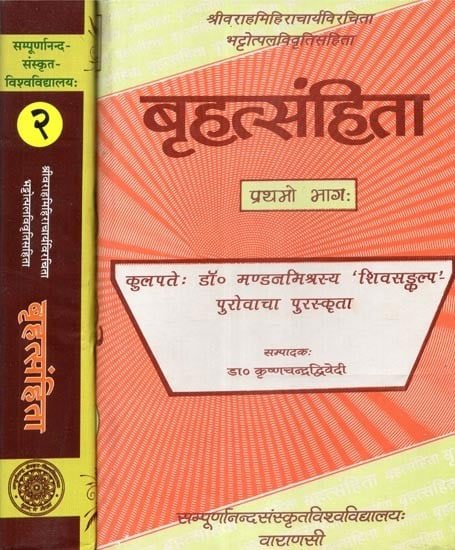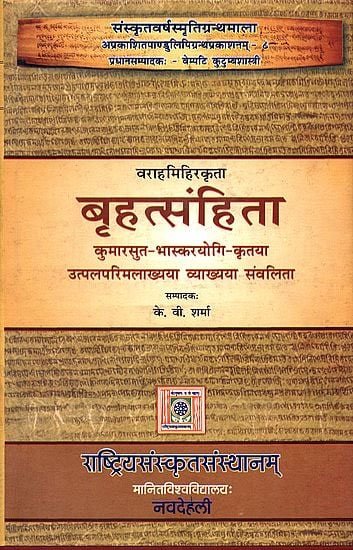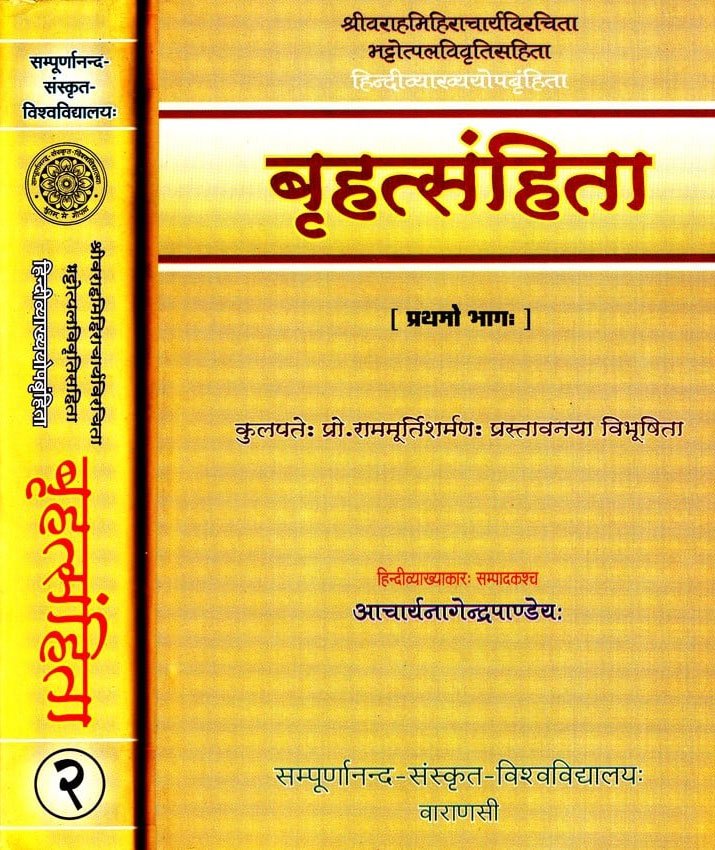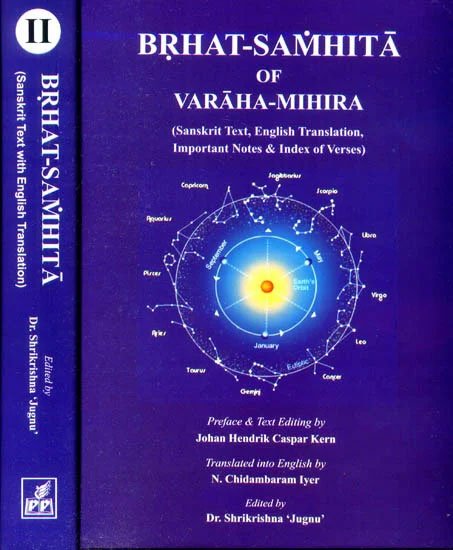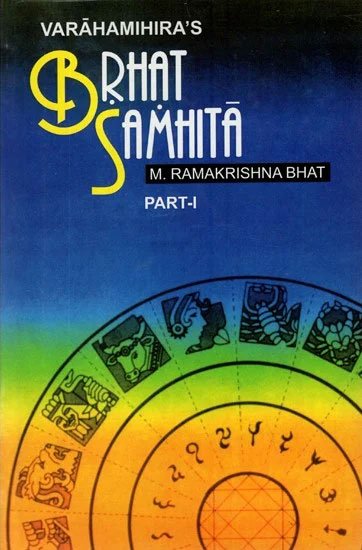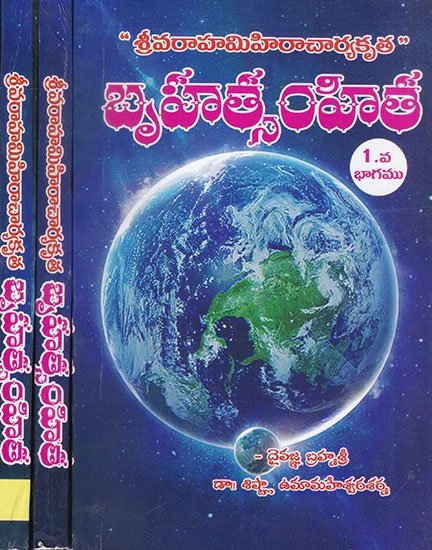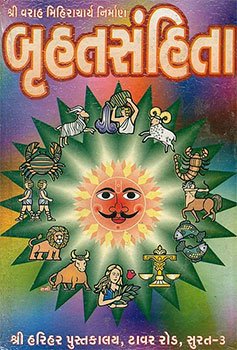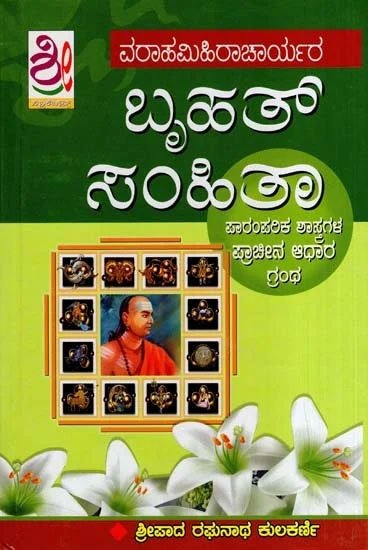Brihat-samhita [sanskrit]
26,560 words
The Sanskrit text of the Brihat-samhita from the 6th-century authored by Varaha Mihira in present-day Ujjain, India. It primarily deals with astrology and astronomy but is presented as an encyclopedia of knowledge.
Verse 50.29
निगदितमिदं यत्तत्सर्वं तुषास्थिविषादिकैः सह मृतिकरं पीडार्तानां समं रुदितक्षतैः ।
अवयवमपि स्पृष्ट्वान्तःस्थं दृढं मरुदाहरेद् ।
अतिबहु तदा भुक्त्वान्नं संस्थितः सुहितो वदेत् ॥ २९ ॥
[क्षुतैः]
nigaditamidaṃ yattatsarvaṃ tuṣāsthiviṣādikaiḥ saha mṛtikaraṃ pīḍārtānāṃ samaṃ ruditakṣataiḥ |
avayavamapi spṛṣṭvāntaḥsthaṃ dṛḍhaṃ marudāhared |
atibahu tadā bhuktvānnaṃ saṃsthitaḥ suhito vadet || 29 ||
[kṣutaiḥ]
The Sanskrit text of Verse 50.29 is contained in the book Brihata Samhita (Sanskrit Text with Hindi Translation) by Pandit Achyutananda Jha. This book is available online or you could buy the latest edition:
Read online Buy now! The Sanskrit text by Pandit Achyutananda Jha (2001)
Glossary of Sanskrit terms
Note: This extracts Sanskrit terms and links to English definitions from the glossary, based on an experimental segmentation of verse (50.29). Some terms could be superfluous while some might not be mentioned. Click on the word to show English definitions.
Nigadita, Idam, Yatta, Tsaru, Tusha, Asthi, Vishad, Vishadin, Vishadi, Kah, Kim, Saha, Kara, Pida, Arta, Samam, Sama, Rudita, Kshata, Avayava, Api, Antahstha, Dridha, Atibahu, Tada, Bhuktva, Anna, Samsthita, Suhita,
Analysis of Sanskrit grammar
Note: this is an experimental feature and only shows the first possible analysis of the Sanskrit text (Verse 50.29). If the system was successful in segmenting the sentence, you will see of which words it is made up of, generally consisting of Nouns, Pronouns, Verbs, Participles and Indeclinables. Click on the link to show all possible derivations of the word.
- Line 1: “nigaditamidaṃ yattatsarvaṃ tuṣāsthiviṣādikaiḥ saha mṛtikaraṃ pīḍārtānāṃ samaṃ ruditakṣataiḥ ”
- nigaditam -
-
nigadita (noun, masculine)[adverb], [accusative single]nigadita (noun, neuter)[adverb], [nominative single], [accusative single]nigaditā (noun, feminine)[adverb]
- idam -
-
idam (pronoun, neuter)[nominative single], [accusative single]
- yatta -
-
yatta (noun, masculine)[compound], [vocative single]yatta (noun, neuter)[compound], [vocative single]√yat -> yatta (participle, masculine)[vocative single from √yat class 1 verb]√yat -> yatta (participle, neuter)[vocative single from √yat class 1 verb]
- tsarva -
-
tsaru (noun, masculine)[compound], [adverb], [nominative dual], [vocative dual], [accusative dual]
- am -
-
a (noun, masculine)[adverb], [accusative single]ā (noun, feminine)[adverb]e (noun, masculine)[accusative single]
- tuṣā -
-
tuṣa (noun, masculine)[compound], [vocative single]
- asthi -
-
asthi (noun, neuter)[compound], [adverb], [nominative single], [vocative single], [accusative single]
- viṣādi -
-
viṣādin (noun, masculine)[compound], [adverb]viṣādin (noun, neuter)[compound], [adverb], [nominative single], [vocative single], [accusative single]viṣādī (noun, masculine)[compound], [adverb]viṣādī (noun, feminine)[compound], [adverb], [vocative single]viṣādī (noun, neuter)[compound], [adverb], [nominative single], [vocative single], [accusative single]viṣād (noun, masculine)[locative single]viṣād (noun, neuter)[locative single]
- kaiḥ -
-
ka (noun, masculine)[instrumental plural]ka (noun, neuter)[instrumental plural]kaḥ (pronoun, masculine)[instrumental plural]kim (pronoun, neuter)[instrumental plural]
- saha -
-
saha (indeclinable postposition)[indeclinable postposition]saha (noun, masculine)[compound], [vocative single]saha (noun, neuter)[compound], [vocative single]√sah (verb class 1)[imperative active second single]
- mṛti -
-
mṛti (noun, feminine)[compound], [adverb]
- karam -
-
kara (noun, masculine)[adverb], [accusative single]kara (noun, neuter)[adverb], [nominative single], [accusative single]
- pīḍā -
-
pīḍa (noun, masculine)[compound], [vocative single]pīḍā (noun, feminine)[nominative single]
- ārtānām -
-
ārta (noun, masculine)[genitive plural]ārta (noun, neuter)[genitive plural]ārtā (noun, feminine)[genitive plural]
- samam -
-
samam (indeclinable)[indeclinable]sama (noun, masculine)[adverb], [accusative single]sama (noun, neuter)[adverb], [nominative single], [accusative single]samā (noun, feminine)[adverb]
- rudita -
-
rudita (noun, masculine)[compound], [vocative single]rudita (noun, neuter)[compound], [vocative single]√rud -> rudita (participle, masculine)[vocative single from √rud class 2 verb]√rud -> rudita (participle, neuter)[vocative single from √rud class 2 verb]√rud (verb class 2)[imperative active second plural]
- kṣataiḥ -
-
kṣata (noun, masculine)[instrumental plural]kṣata (noun, neuter)[instrumental plural]√kṣan -> kṣata (participle, masculine)[instrumental plural from √kṣan class 8 verb]√kṣan -> kṣata (participle, neuter)[instrumental plural from √kṣan class 8 verb]
- Line 2: “avayavamapi spṛṣṭvāntaḥsthaṃ dṛḍhaṃ marudāhared ”
- avayavam -
-
avayava (noun, masculine)[adverb], [accusative single]avayavā (noun, feminine)[adverb]
- api -
-
api (indeclinable preposition)[indeclinable preposition]ap (noun, neuter)[locative single]
- spṛṣṭvā -
-
√spṛś -> spṛṣṭvā (absolutive)[absolutive from √spṛś]
- antaḥstham -
-
antaḥstha (noun, masculine)[adverb], [accusative single]antaḥstha (noun, neuter)[adverb], [nominative single], [accusative single]antaḥsthā (noun, feminine)[adverb]
- dṛḍham -
-
dṛḍha (noun, masculine)[adverb], [accusative single]dṛḍha (noun, neuter)[adverb], [nominative single], [accusative single]dṛḍhā (noun, feminine)[adverb]
- Cannot analyse marudāhared
- Line 3: “atibahu tadā bhuktvānnaṃ saṃsthitaḥ suhito vadet || 29 |”
- atibahu -
-
atibahu (noun, masculine)[compound], [adverb]atibahu (noun, neuter)[compound], [adverb], [nominative single], [vocative single], [accusative single]atibahu (noun, feminine)[compound], [adverb]
- tadā* -
-
tadā (noun, feminine)[nominative plural], [vocative plural], [accusative plural]tada (noun, masculine)[nominative plural], [vocative plural]
- bhuktvā -
-
bhuktvā (indeclinable)[indeclinable]√bhuj -> bhuktvā (absolutive)[absolutive from √bhuj]√bhuj -> bhuktvā (absolutive)[absolutive from √bhuj]√bhuj -> bhuktvā (absolutive)[absolutive from √bhuj]
- annam -
-
anna (noun, masculine)[adverb], [accusative single]anna (noun, neuter)[adverb], [nominative single], [accusative single]annā (noun, feminine)[adverb]
- saṃsthitaḥ -
-
saṃsthita (noun, masculine)[nominative single]
- suhito* -
-
suhita (noun, masculine)[nominative single]
- vadet -
-
√vad (verb class 1)[optative active third single]
- Cannot analyse 29
Other editions:
Also see the following editions of the Sanskrit text or (alternative) English translations of the Verse 50.29
Brhatsamhita with the Commentary of Bhattotpala
by Krishna Chandra Dwivedi (2016)
Publisher: Sampurnanand Sanskrit University; 1229 pages;
Buy now!
Brihat Samhita with the Commentary of Utpalapatimala of Yogisvara
by K. V. Sharma (2012)
Publisher: Rashtriya Sanskrit Sansthan, Janakpuri; 754 pages; ISBN-10; 8186111360; ISBN-13: 9788186111369
Buy now!
Brihat Samhita (Hindi Translation)
by K. V. Sharma (2002)
Publisher: Sampurnanand Sanskrit University; 2359 pages; ISBN-13: 9789387890008.
Buy now!
Brhat Samhita (English translation)
by N. Chidambaram Iyer (2022)
Publisher: Parimal Publication Pvt. Ltd.; 801 pages; Edited by Dr. Shrikrishna Jugnu; ISBN-10: 8171104215; ISBN-13: 9788171104215.
Buy now!
Brhat Samhita (English with notes)
by M. Ramakrishna Bhat (2010)
Publisher: Motilal Banarsidas Publishers Pvt. Ltd.; 1155 pages; ISBN-10: 8120810600; ISBN-13: 9788120810600.
Buy now!
Brhat Samhita (Telugu translation)
by Sishtla Umamaheswara Sharma (2020)
Publisher: Mohan Publications, Andhra Pradesh; 846 pages.
Buy now!Preview of verse 50.29 in Kannada sript:
ನಿಗದಿತಮಿದಂ ಯತ್ತತ್ಸರ್ವಂ ತುಷಾಸ್ಥಿವಿಷಾದಿಕೈಃ ಸಹ ಮೃತಿಕರಂ ಪೀಡಾರ್ತಾನಾಂ ಸಮಂ ರುದಿತಕ್ಷತೈಃ ।
ಅವಯವಮಪಿ ಸ್ಪೃಷ್ಟ್ವಾನ್ತಃಸ್ಥಂ ದೃಢಂ ಮರುದಾಹರೇದ್ ।
ಅತಿಬಹು ತದಾ ಭುಕ್ತ್ವಾನ್ನಂ ಸಂಸ್ಥಿತಃ ಸುಹಿತೋ ವದೇತ್ ॥ ೨೯ ॥
[ಕ್ಷುತೈಃ]
Brhat Samhita (Gujarati translation)
by - (2000)
Publisher: Shree Harihar Pustakalay, Surat; Author: Shri Varahamihira Acharya (શ્રી વરાહમિહીરાચાર્ય); 432 pages.
Buy now!Preview of verse 50.29 in Gujarati sript:
નિગદિતમિદં યત્તત્સર્વં તુષાસ્થિવિષાદિકૈઃ સહ મૃતિકરં પીડાર્તાનાં સમં રુદિતક્ષતૈઃ ।
અવયવમપિ સ્પૃષ્ટ્વાન્તઃસ્થં દૃઢં મરુદાહરેદ્ ।
અતિબહુ તદા ભુક્ત્વાન્નં સંસ્થિતઃ સુહિતો વદેત્ ॥ ૨૯ ॥
[ક્ષુતૈઃ]
Brhat Samhita (Kannada translation)
by Sripada Raghunatha Kulkarni (2021)
Publisher: Srinidhi Publications, Bangalore; 668 pages with illustrations.
Buy now!Preview of verse 50.29 in Kannada sript:
ನಿಗದಿತಮಿದಂ ಯತ್ತತ್ಸರ್ವಂ ತುಷಾಸ್ಥಿವಿಷಾದಿಕೈಃ ಸಹ ಮೃತಿಕರಂ ಪೀಡಾರ್ತಾನಾಂ ಸಮಂ ರುದಿತಕ್ಷತೈಃ ।
ಅವಯವಮಪಿ ಸ್ಪೃಷ್ಟ್ವಾನ್ತಃಸ್ಥಂ ದೃಢಂ ಮರುದಾಹರೇದ್ ।
ಅತಿಬಹು ತದಾ ಭುಕ್ತ್ವಾನ್ನಂ ಸಂಸ್ಥಿತಃ ಸುಹಿತೋ ವದೇತ್ ॥ ೨೯ ॥
[ಕ್ಷುತೈಃ]
![Brihat-samhita [sanskrit] - book cover](/uploads/a/Brihat-Samhita-Sanskrit.jpg)
